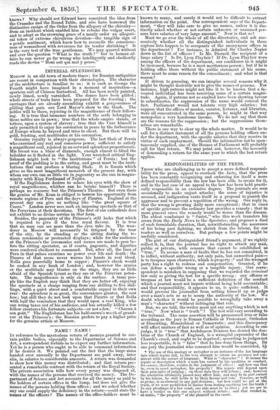IMPERIAL SPLENDOURS.
Moscow is an old town of modern times ; for Russian antiquities are recent in comparison with their chronologies. The character of the architecture is familiar to us ; it is such as George the 'Fourth might have imagined in a moment of inspiration—a spurious sort of Chinese fantastical. All has been newly painted, newly limed, newly varnished. The domes have been gilded ; whole streets of tents have been prepared for the feasting ; the carriages that are already assembling exhibit a Porgeousness of gilding that puts our Lord Mayor's show to the blush. The nobles will be there, rejoicing in the magnificence of their follow- ing. It is true that immense numbers of the serfs belonging to those nobles are in pawn ; true that the whole empire stands, or totters, upon a system of slavery; true that the Czar himself is only permitted to enjoy his coronation in peace by the forbearance of Europe whom he braved and tries to cheat. But there will be gold, feasting, and multitudes at his coronation. Genuine royalty is always gorgeous. The last Shah of Persia who exercised any real and conscious power, sufficient to satisfy a magnificent soul, rejoiced in an outward splendour proportionate. His breast was a blaze of diamonds, enough almost to blind the beholder as it flashed in the light. Your wretched critical Eng- lishman might look to " the institutions " of Persia ; but the proof of the pudding is in the eating, and great must be the insti- tutions that can produce a blazing Shah. It is Russia which gives us the most magnificent monarch of the present day, with whom our own can as the vie in pageantry as she can in magna- nimity with King Ferdinand of Naples.
If the Englishman desires to solace his eyes with the show of royal magnificence, whither can he betake himself? There is perhaps no resource but the Princess's Theatre. But even there the genius of Mr. Kean is obliged to borrow his opportunity from remote regions of Peru and the days of Pizarro. England at the present day can give us nothing like " the great square of Cuzco." London never sees such an imposing spectacle as that of the Peruvians at their devotions. The first of our cathedrals does not exhibit to us divine service in that form.
Besides, the pageantry of the Princess's still lacks that which is required to give it the true royal flavour. It is true that no man can see more than the eyes take in. The wan- derer in Moscow will necessarily be fatigued by the tour of the city, by the standing or the sitting during the te- dious ceremonies or protracted displays ; while for the audience at the Princess's the ceremonies and scenes are made to pass be- fore the sitting spectator, as if courts, pageants, and dignities were rendered obedient to command. But, after all, the Inca of Peru in that palace exercises no power over life and death : the Pizarro of that scene never warms his hands in real blood. Rolla goes peacefully home to supper ; Pizarro's check would be cashed in any bank of London ; and, however the armies or the multitude may bluster on the stage, they are as little afraid of the Spanish tyrant as they are of the Peruvian poten- tate. The magnificence is only on the surface. A tame peo- ple like the English may think that they are better off, enjoying the spectacle at a charge ranging from one shilling to five shil- lings, with a quiet street and a comfortable supper in their own rear : the splendour is as great, the convenience greater, the cost less ; but still they do not look upon that Pizarro or that Rolla with half the veneration that they would upon a real King, who can wring taxes out of his audience, and has actually killed a few 'fellow creatures his fortunate subjeCts—or not a few. " Chaeun son gotit." The Englishman has his half-crown's worth of grand- eur at the Princess's ; the Russian prefers to pay a higher price for the genuine article at Moscow.


































 Previous page
Previous page